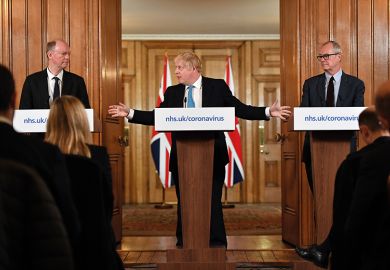When it comes to the impact of the coronavirus on the food system, the UK’s lack of preparation is “doubly embarrassing” given it was already a focus of Brexit preparations, according to Tim Lang, professor of food policy at City, University of London.
The long-term problems are set out in his unexpectedly timely new book, Feeding Britain: Our Food Problems and How to Fix Them (Pelican), where section headings such as “Food damages the environment on which it depends”, “Diet-related ill-health has been normalized”, “Food waste is systemic” and “Social inequalities keep food poverty going” give a good sense of the overall analysis.
But although some of this comes down to inertia and vested interests, he pointed out, the Brexit debate, and particularly the repeated possibility of a no-deal outcome, meant that “the entire food system came into play as something which could easily be disrupted”.
Professor Lang had seen evidence, for example, that two-minute checks on one in a hundred wagons coming through Dover “could create 15- or 20-mile tailbacks within three days. Those calculations were done and very clear advice given to central government...But unlike a no-deal Brexit, where the dynamics were quite easy to plot, no one can really predict the impact of the coronavirus on the just-in-time supply chain.”
A former farmer who has now been a food policy analyst for about four decades and set up City’s Centre for Food Policy in 1994, Professor Lang was nonetheless worried about how established patterns could be exacerbating the problem. He recently joined forces with colleagues to write an open letter to the prime minister on food planning in the crisis.
When Boris Johnson had told the British people to minimise the frequency of their food shopping during the crisis, he explained, that left open many questions: “How much food? Of what kind?”
Instead, Professor Lang argued, we were seeing a continuance of “the new default principle of ‘Leave it to Tesco et al’”.
He added: “There’s no coherence. That adds to anxiety and [led us to ask for] a rational system of rationing.”
While Professor Lang admitted that there were bigger issues that “need to be thought through and can’t be resolved in the middle of the crisis” – such as whether we should just continue buying whatever food we liked whenever we liked, or whether we need to take nutrition more seriously – he also wanted to see a number of things happening now.
He called for “a Food Security and Resilience Council” to be rapidly created, for example, and the creation of a Food Advisory Group of Experts with a powerful figurehead (alongside the existing Scientific Advisory Group of Experts and the Chief Medical Officer) to bring in academics and others to “shape and then give the food cultural advice, in parallel to the social behaviour advice”.
According to Professor Lang’s book, the UK food system suffers from many major defects, including a “hangover from food imperialism” leading to “a malign assumption that we have a right to be fed”.
Might the current crisis offer scope to address some deep-seated challenges?
“The powerful are already starting to take their chance,” Professor Lang replied. “The cynical Machiavellians and the politicians would say ‘Never waste a good crisis’.”
He believed there was evidence of “predatory behaviour” on the part of retailers that were “wanting to step in and pick up on the prime minister’s idea of having vouchers redeemable in food shops to replace free school meals and for people on low incomes. They are trying to ease out co-ops and social enterprises, and get rid of the work of school canteens...Crises can be used by the powerful to accelerate power.”
Fortunately, however, this was only one side of the story. Alongside the retailers, according to Professor Lang, Britain had “a magnificent civil society sector devoted to food which is active, well organised and has years of engagement”.
“I know my public policy history,” he reflected. “Ideas have their moments. You can never tell what will happen.
“That’s why people like me are trying to put ideas out into the public sphere. [Development economist] Amartya Sen shows that one of the causes of the Bengal Famine was that people didn’t have a sense of ‘entitlement’. They didn’t protest.”
Professor Lang added that if “civil society” positions on food were advanced powerfully enough, the country might emerge from the crisis with an improved food sector. “They are the people who give me hope.”
Register to continue
Why register?
- Registration is free and only takes a moment
- Once registered, you can read 3 articles a month
- Sign up for our newsletter
Subscribe
Or subscribe for unlimited access to:
- Unlimited access to news, views, insights & reviews
- Digital editions
- Digital access to THE’s university and college rankings analysis
Already registered or a current subscriber?








